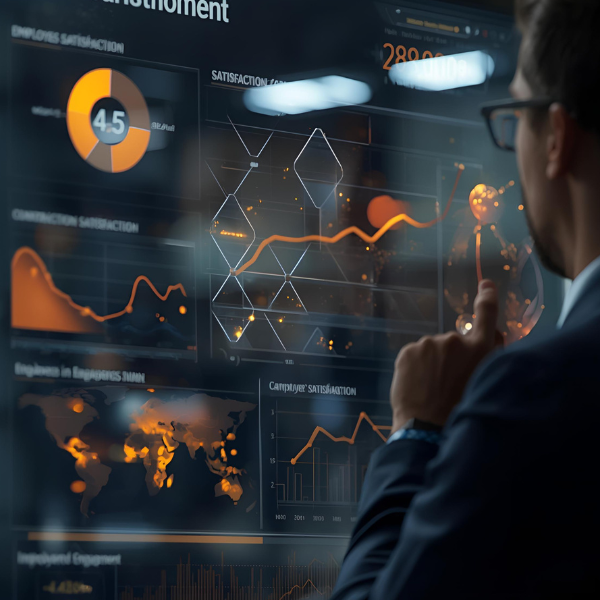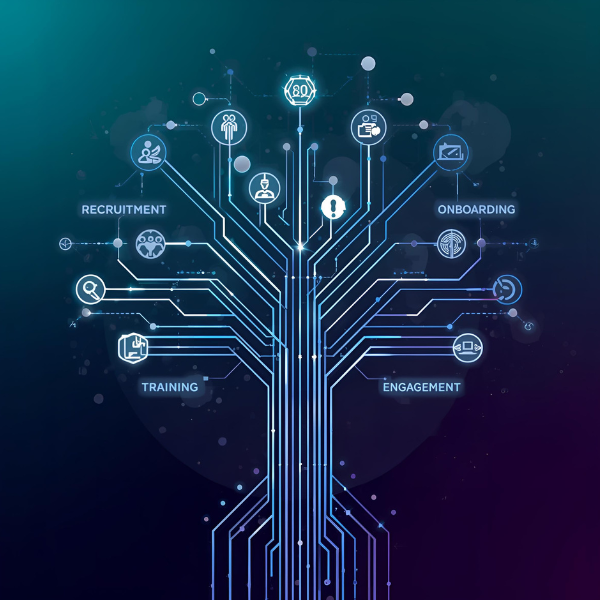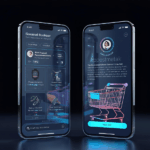
AI in HR: Revolutionizing Recruitment & Engagement
AI in HR: Revolutionizing Recruitment and Employee Engagement
The Human Resources department has always been the heart of an organization, responsible for its most valuable asset: its people. Today, artificial intelligence is transforming HR from a traditionally administrative function into a strategic powerhouse. By automating routine tasks and providing deep, data-driven insights, AI in HR is not just improving efficiency—it is fundamentally revolutionizing how companies attract, hire, and engage talent.
This post explores the profound impact of AI on two critical HR functions: recruitment and employee engagement. We will delve into how AI-powered tools are creating a more efficient and fair hiring process, and how they are helping organizations build a more connected and motivated workforce. Get ready to see how you can leverage these technologies to build a significant competitive advantage.
Streamlining Recruitment from Sourcing to Hiring
The talent acquisition process is often long, complex, and filled with repetitive tasks. AI offers a suite of tools that can automate and optimize nearly every stage of the recruitment funnel, allowing HR professionals to focus on what they do best: building relationships with candidates.
Automated Candidate Sourcing and Screening
Finding the right candidates is one of the biggest challenges in recruitment. AI-powered sourcing tools can scan millions of profiles across professional networks, job boards, and internal databases to identify qualified candidates who may not even be actively looking for a new job. These tools go beyond simple keyword matching, using machine learning to understand the nuances of job descriptions and candidate profiles.
Once applications start pouring in, AI can screen resumes in seconds. It intelligently parses and ranks candidates based on skills, experience, and other predefined criteria. This eliminates the time-consuming manual review process and, when implemented correctly, can help reduce unconscious bias by focusing solely on qualifications.
Key Benefits:
- Wider Talent Pool: AI uncovers passive candidates that manual searches might miss.
- Time Savings: Drastically reduces the time spent on screening resumes.
- Improved Quality of Hire: Focuses recruiters’ attention on the most qualified applicants.

Intelligent Interview Scheduling and Communication
Coordinating interviews between candidates and multiple team members can be a logistical nightmare. AI-powered scheduling bots can integrate with calendars, find mutually available times, and send invitations automatically.
Beyond scheduling, AI chatbots can serve as a 24/7 point of contact for candidates. They can answer frequently asked questions about the company, the role, or the application status. This ensures a positive and responsive candidate experience, even when recruiters are busy.
Key Benefits:
- Efficiency: Eliminates the back-and-forth emails required for scheduling.
- Enhanced Candidate Experience: Provides instant communication and keeps candidates engaged.
Fostering a More Engaged and Productive Workforce
Recruitment is just the beginning. Once an employee is on board, keeping them engaged, motivated, and growing is essential for retention and productivity. AI is providing innovative ways for HR to support employees throughout their entire lifecycle with the company.
Personalized Learning and Development
A one-size-fits-all approach to training is no longer effective. AI-powered Learning Management Systems (LMS) can create personalized learning paths for each employee. By analyzing an employee’s role, current skills, performance data, and career aspirations, these platforms can recommend relevant courses, articles, and training modules.
This adaptive learning approach ensures that employees receive training that is directly applicable to their needs and goals. It empowers them to take control of their professional development, leading to higher skill acquisition and job satisfaction.
Key Benefits:
- Targeted Skill Development: Ensures training is relevant and impactful.
- Increased Engagement: Employees are more motivated to learn when content is personalized.
- Scalable Training: Provides customized development plans for the entire organization.

Real-Time Feedback and Sentiment Analysis
Annual performance reviews are becoming a thing of the past. AI enables a culture of continuous feedback. Tools like pulse surveys, which are short and frequent check-ins, can gather real-time data on employee sentiment, morale, and engagement levels.
AI algorithms can then analyze this data, including unstructured text comments, to identify emerging trends or potential issues within specific teams or across the organization. For example, sentiment analysis can flag a dip in morale in a particular department, allowing HR and managers to intervene proactively before it becomes a larger problem. This provides a clear, data-backed view of the health of the organization.
Key Benefits:
- Proactive Problem-Solving: Identifies issues before they escalate.
- Data-Driven Decisions: Provides HR leaders with concrete data to guide strategy.
- Anonymity and Honesty: Encourages employees to provide more candid feedback.
Implementing AI in HR: Where to Start
Adopting AI can feel daunting, but it doesn’t require a complete overhaul of your HR function overnight.
- Identify Your Biggest Pain Points: Start by targeting the most time-consuming or challenging process in your HR workflow. Is it resume screening? Or perhaps employee turnover?
- Start Small and Demonstrate ROI: Select an AI tool that addresses a specific problem. A successful pilot project, such as implementing a scheduling bot, can build momentum and secure buy-in for larger initiatives.
- Prioritize Ethics and Transparency: When using AI, especially in recruitment, it’s crucial to ensure fairness and transparency. Regularly audit your AI tools for bias and be clear with candidates and employees about how their data is being used.
Conclusion
AI in HR is not about replacing the human element; it’s about enhancing it. By automating administrative burdens and providing powerful insights, AI frees up HR professionals to focus on more strategic, people-centric initiatives. From creating a more efficient and equitable recruitment process to fostering a deeply engaged and developing workforce, AI is a powerful partner in building a better workplace. Organizations that embrace these technologies will not only optimize their operations but will also create a more positive and productive environment for their most important asset—their people.


